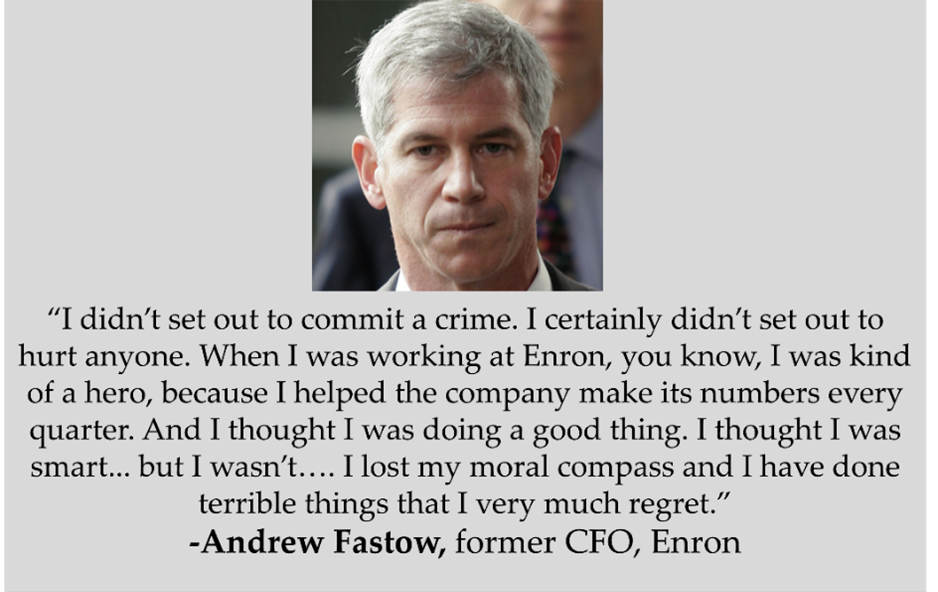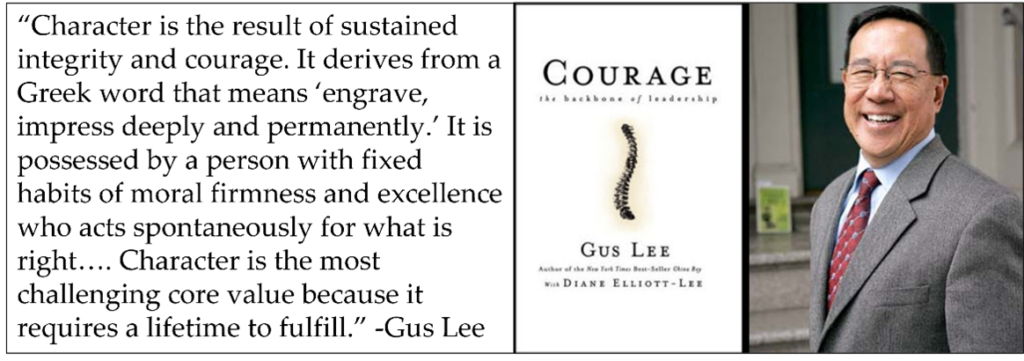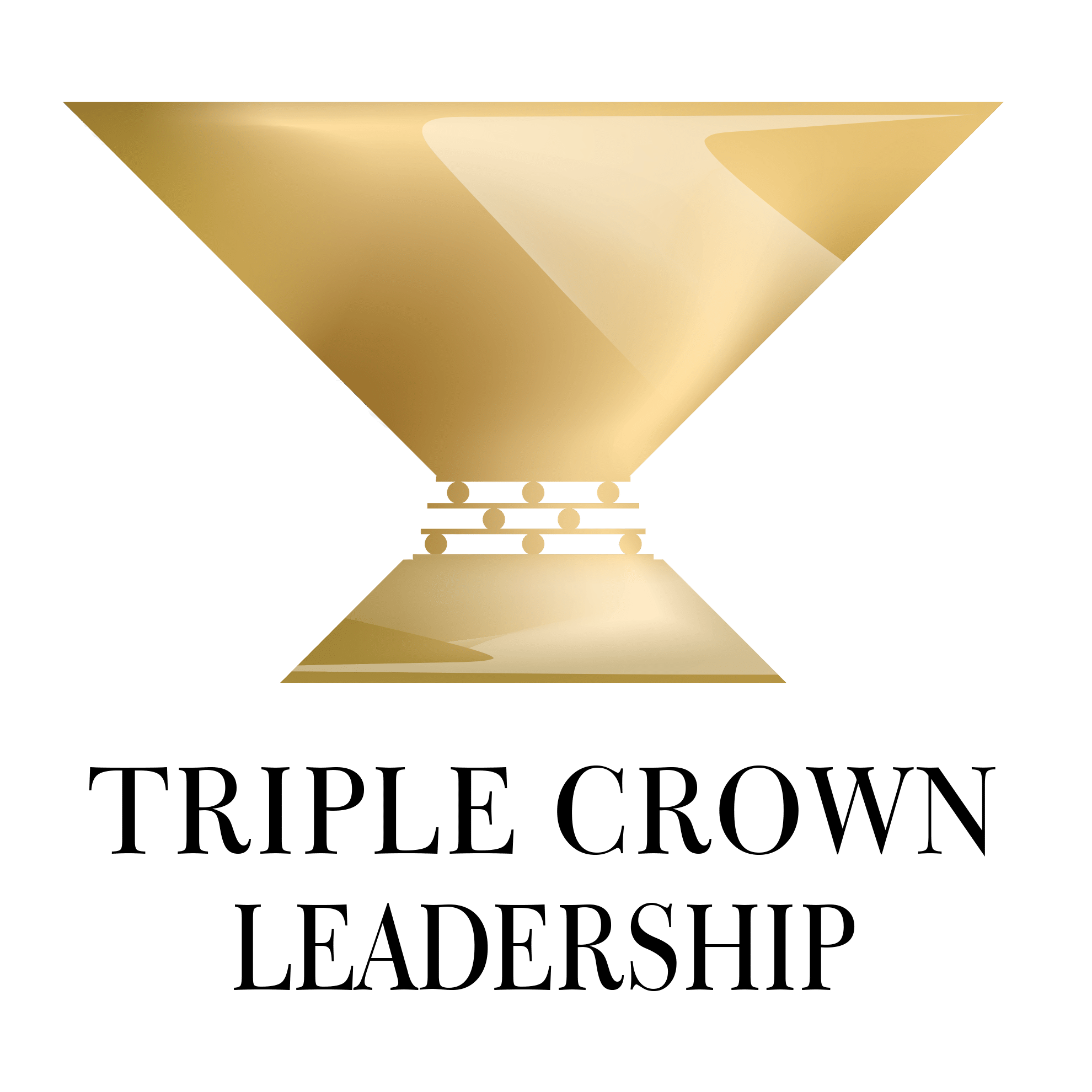There I was, giving a guest lecture on leadership at a European business school, when I got an intriguing question from a student in the back of the room:
“Excuse me, why are we talking about ethics? This is a course about leadership.”
I came to realize what a gift this question was. His question was so revealing about how we perceive business and leadership today. So revealing about the chasm between how people think about and practice leadership. And so revealing about things we can take for granted and miss if we’re not careful.
The question created a teachable moment — a space in which we could dive in and explore the crossover of concepts, the relationship between ethics and leadership.
My short-version answer to his question is that leadership and ethics are inseparable.
Leadership and ethics are inseparable.
We don’t have to fly to the astral realm of moral philosophers to see this. No, we can begin right where we are, in any organization, team, family, or endeavor. Soon enough in any group or activity, we’ll see that there will be ethical choices to make and dilemmas to face.
In all sorts of human endeavors we quickly run into issues of fairness, justice, truth, transparency, and trust. Deception and harm. Too often, we’re unprepared for these tough issues. We just wing it, often with poor results. Sometimes horrible ones.

Sometimes when we talk about ethics, we use terms like ethics, honesty, integrity, and values interchangeably or imprecisely, causing confusion. There are many ways to think about these terms, and they’re all related. Let’s unpack and clarify them
Ethics
Ethics is a set of principles of right conduct, helping us determine right from wrong. In our book, Triple Crown Leadership: Building Excellent, Ethical, and Enduring Organizations, we defined ethics simply as “doing the right thing, even when it’s costly or hard.”
Note that we can have personal ethical views and standards that differ from those at different levels (family, group, organization, nation, religion, culture, society).
Integrity
Integrity means living in a state of moral uprightness, acting in accordance with strong moral principles. It’s also the state of being whole and undivided.

See my article on “The Importance of Integrity in Leadership.”
Character
People with character demonstrate moral excellence and firmness. They exhibit the good qualities of a person, usually including moral strength, honesty, and fairness.

Honesty
When we’re honest, we’re exhibiting truthfulness, including not only adherence to the facts but also freedom from deceit or fraud. People look for honesty in their leaders—and turn away when there are deceptions, evasions, and lies.
“In every survey we’ve conducted, honesty is selected more often than any other leadership characteristic. Overall, it emerges as the single most important factor in the leader constituent relationship…. First and foremost, people want a leader who is honest.” – James Kouzes and Barry Posner, The Leadership Challenge
Credibility
Having credibility means being trusted and believed in. When we have credibility, we’re believed and people accept our claims as true, real, and honest.

See my article on “The Importance of Credibility in Leadership.”
Trust
Trust is the belief that someone or something is reliable, good, honest, and effective. As it turns out, trust is essential for any relationship, team, or organization to function well. When we have it, it helps on so many levels. When we don’t, it can be excruciating.
“Trust is the most significant predictor of individuals’ satisfaction within their organizations.” – James Kouzes and Barry Posner, The Leadership Challenge
See my article on “The Importance of Trust in Leadership.“
Values
Our values are what we deem most important, worthy, or valuable (i.e., what we value most). They’re often thought of as principles or standards of behavior (e.g., how we will treat each other) based on judgment about what’s important. Ideally our values help us decide how to act in various situations.

“It’s not hard to make decisions when you know what your values are.” – Roy Disney, co-founder of The Walt Disney Company

Personal Values Exercise
Complete this exercise to identify your personal values. It will help you develop self-awareness, including clarity about what’s most important to you in life and work, and serve as a safe harbor for you to return to when things are tough.
Ethics in Practice
All of these—ethics, integrity, character, honesty, credibility, and values—may sound straightforward, but that doesn’t mean they’re easy to actualize. Far from it. Life and work often present us with tricky issues and ethical dilemmas, especially when we’re in a position of influence or authority.
“Most of us think that the important ethical decisions in our lives will be delivered with a blinking red neon sign:
CAUTION: IMPORTANT DECISION AHEAD … The problem is, life seldom works that way.” – Clayton Christensen, professor and innovation consultant

We tend to overrate how ethical we are, according to researchers. And we tend to take ethics for granted and not steel ourselves for the tough choices we’ll face under pressure.
“…much of what goes wrong isn’t caused by bad people doing bad things;
it’s caused by good people doing bad things without knowing that they’re doing something bad.
We have many optimistic illusions about ourselves,
and we tend to behave unethically in ambiguous contexts.
So when ethical lapses occur, they rarely happen in situations
when what is right versus what is wrong is clear.
They more typically occur when what is morally right is less clear,
such as ‘doing what is right versus loyalty to the organization,’
or ‘doing what is right versus doing what I was told to do,’
or some other context that causes confusion.”
– Max Bazerman, professor, Harvard Business School
The Challenges of Ethical Leadership
We’re all flawed. We all make mistakes. Ethical leadership is challenging in part because of the way humans have evolved to seek safety and comfort in tribes and groups. Ethical leadership is hard because:
- We can face pressure from peers or managers (or from ourselves) to take questionable or unethical actions.
- We all have ethical blind spots.
- We all struggle sometimes with actually doing what we know is right, because of the pressures and influences on us.
- Values sometimes conflict (e.g., truth vs. loyalty, self-interest vs. group interests) so we need to make tough choices sometimes.
- There are different ethical traditions and approaches (e.g., virtue ethics, utilitarian and consequentialist ethics, duty ethics, communitarian ethics), and this can be confusing.
- We’re very good at rationalizing questionable and problematic ethical decisions and actions.
The Benefits of Ethical Leadership
Challenges aside, there are many powerful benefits that come from ethical leadership. It can help us:
- make good choices that we’re proud of and that will stand the test of time
- avoid trouble and reputational and relationship damage
- build and maintain trust, which helps with everything else we do with others
- develop and maintain good relationships and careers
- lead a more fulfilling life that we’ll look back on with satisfaction
Conclusion
For leaders to be effective over the long haul, they must demonstrate a commitment to ethical conduct. They must act with integrity and build their character over time. Leaders must be honest and earn trust and credibility from their colleagues.
They can do this through values-based leadership and what we call “triple crown leadership“—a commitment to building an organization that’s excellent (achieves exceptional results and positive impacts for all stakeholders), ethical (does the right thing, even when it’s costly or hard), and enduring (stands the test of time and operates sustainably).
So, why are we talking about ethics? Because it’s essential to excellent and effective leadership—and to a good life.
Why are we talking about ethics? Because it’s essential to excellent and effective leadership—and to a good life.
–Gregg Vanourek


Leadership Derailers Assessment
Take this assessment to identify what’s inhibiting your leadership effectiveness. It will help you develop self-awareness and identify ways to improve your leadership.
Reflection Questions
- To what extent are you and your colleagues acting ethically?
- Are you building trust and credibility through honesty, integrity, and character?
- Are you working for an organization that practices ethical leadership?
- What can you do to improve on these fronts?
Tools for You
- Leadership Derailers Assessment to help you identify what’s inhibiting your leadership effectiveness
- Personal Values Exercise to help you determine and clarify what’s most important to you
- Alignment Scorecard to help you assess your organization’s level of alignment
Related Articles: Ethical Leadership
- “Ethical Leadership: Our Gamechanger“
- “The Root Cause of Ethical Failings (and Our Political Dysfunction)“
- “The Most Important Questions for Leaders“
- “The Problem of Bad Leaders—and Why People Keep Following Them“
- “Ethical Decision-Making: Simple Tests for Leaders“
- “The Ethical Challenges Faced by Leaders“
- “Ethical Pitfalls–You Will Be Tested“
- “What’s So Hard about Ethics?“
Postscript: Inspirations on Ethical Leadership
- “Leading with positive ethical values builds trust and brings out the best in people, which brings out the best in the organization, which leads to great results.” -Linda Fisher Thornton
- “Action, indeed, is the sole medium of expression for ethics.” -Jane Addams
- “Waste no more time arguing what a good man should be. Be one.” -Marcus Aurelius
- “I look for three things in hiring people. The first is personal integrity, the second is intelligence, and the third is high energy level. But if you don’t have the first, the other two will kill you.” -Warren Buffett
- “The supreme quality for leadership is unquestionable integrity. Without it, no real success is possible, no matter whether it is on a section gang, a football field, in an army or in an office.” -Dwight D. Eisenhower
- “The ultimate test of integrity is what we’re willing to risk to uphold our core values.” -Adam Grant
- “Real integrity is doing the right thing, knowing that nobody’s going to know whether you did it or not.” -Oprah Winfrey
- “Integrity doesn’t demand perfection. Even the most morally committed people blow it. Integrity doesn’t guarantee a perfect life, but it does require an integrated life.” – Sid Buzzell
- “Integrity goes far beyond telling the truth. Integrity means total congruence between who we are and what we do.” -Kevin Cashman
- “Ninety percent of all leadership failures are character failures.” -Stephen R. Covey
- “Faced with crisis, the man of character falls back upon himself.” -Charles de Gaulle
- “Character—the willingness to accept responsibility for one’s own life — is the source from which self-respect springs.” – Joan Didion
- “Character is destiny.” -Heraclitus
- “Character is how you act when you think no one is watching, but conscience is the inner voice that warns us that someone may be.” -Michael Josephson
- “Reputation is the shadow. Character is the tree.” -Abraham Lincoln
- “People grow through experience if they meet life honestly and courageously. This is how character is built.” – Eleanor Roosevelt
- “Character, in the long run, is the decisive factor in the life of an individual and of nations alike.” -Theodore Roosevelt
- “Leadership includes two components: competence and character. Ninety-nine percent of the failure in leadership is because of a failure in character rather than competence.” -Norman Schwarzkopf
- “The most important human endeavor is the striving for morality in our actions. Our inner balance and even our very existence depend on it. Only morality in our actions can give beauty and dignity to life.” – Albert Einstein
- “In the absence of integrity, great leadership cannot exist, only egotistical pretenses of it. Integrity, emotional maturity, and great leadership are inseparable.” -Ed Morler
- “The fruit of this life is good character and acts for the common good.” -Marcus Aurelius
- “…honesty includes not only telling the truth, but also leaving the right impression. It’s possible to tell the truth, but leave the wrong impression. And that’s not being honest.” -Stephen M. R. Covey
- “Never, never be afraid to do what’s right, especially if the well-being of a person or animal is at stake. Society’s punishments are small compared to the wounds we inflict on our soul when we look the other way.” -Martin Luther King, Jr.
- “It’s easier to hold to your principles 100 percent of the time than it is to hold to them 98 percent of the time.” – Clayton Christensen
- “When a man is getting better he understands more and more clearly the evil that is still left in him. When a man is getting worse he understands his own badness less and less. A moderately bad man knows he is not very good: a thoroughly bad man thinks he is all right. This is common sense, really. You understand sleep when you are awake, not while you are sleeping. You can see mistakes in arithmetic when your mind is working properly: while you are making them you cannot see them. You can understand the nature of drunkenness when you are sober, not when you are drunk. Good people know about both good and evil: bad people do not know about either.” -C.S. Lewis, Mere Christianity

Alignment Scorecard
When organizations aren’t aligned, it can reduce performance dramatically and cause frustration and dysfunction. With this Alignment Scorecard, you can assess your organization’s level of alignment and make plans for improving it.
++++++++++++++++
Gregg Vanourek is a writer, teacher, speaker, and coach on leadership and personal development. He is co-author of three books, including Triple Crown Leadership: Building Excellent, Ethical, and Enduring Organizations (co-authored with his father, Bob Vanourek) and LIFE Entrepreneurs: Ordinary People Creating Extraordinary Lives (a manifesto for integrating our life and work with purpose and passion). Sign up for our monthly newsletter. If you found value in this article, please forward it to a friend. Every little bit helps!


